PSYCHOLOGY: Examining Alcohol Addiction, FASD, and Impact in Canada
VerifiedAdded on 2023/04/23
|10
|2655
|143
Essay
AI Summary
This essay examines the impact of alcohol addiction and Fetal Alcohol Spectrum Disorders (FASD) in Canada. It discusses the prevalence of FASD, particularly among aboriginal populations, and its effects on the mind, body, and behavior of affected individuals, including cognitive impairments, physical abnormalities, and behavioral issues. The essay also explores the medical model of addiction, highlighting its biological and neurological underpinnings, and discusses the importance of understanding the pathophysiology of FASD for effective interventions. Furthermore, it includes learning activity responses emphasizing the need for psychological support and behavioral therapies for individuals with alcohol addiction and FASD. The essay concludes by referencing various studies and research articles to support its claims and provide a comprehensive overview of the topic.

1PSYCHOLOGY
PSYCHOLOGY
Name of the Student
Name of the university
Author’s note
PSYCHOLOGY
Name of the Student
Name of the university
Author’s note
Paraphrase This Document
Need a fresh take? Get an instant paraphrase of this document with our AI Paraphraser
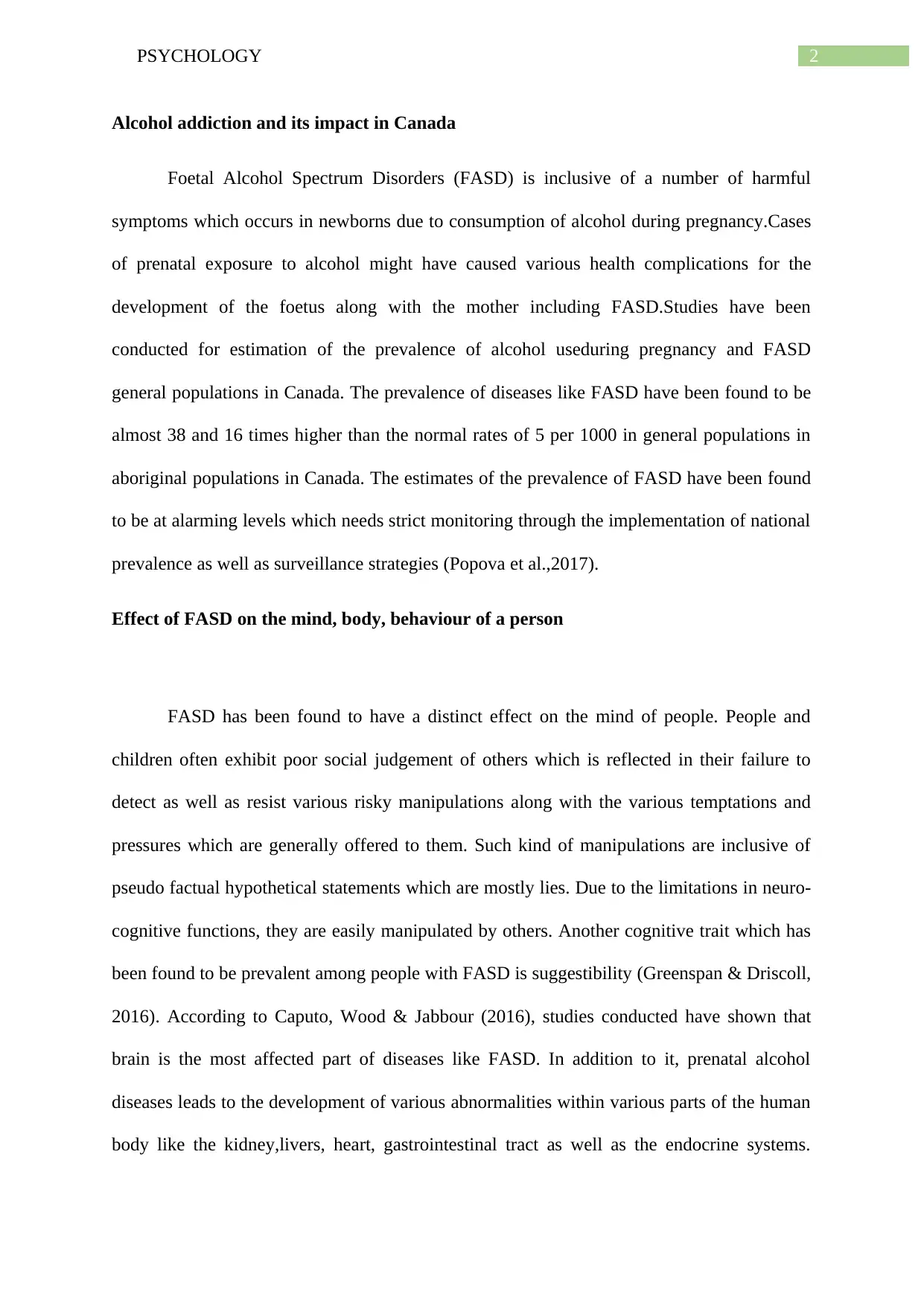
2PSYCHOLOGY
Alcohol addiction and its impact in Canada
Foetal Alcohol Spectrum Disorders (FASD) is inclusive of a number of harmful
symptoms which occurs in newborns due to consumption of alcohol during pregnancy.Cases
of prenatal exposure to alcohol might have caused various health complications for the
development of the foetus along with the mother including FASD.Studies have been
conducted for estimation of the prevalence of alcohol useduring pregnancy and FASD
general populations in Canada. The prevalence of diseases like FASD have been found to be
almost 38 and 16 times higher than the normal rates of 5 per 1000 in general populations in
aboriginal populations in Canada. The estimates of the prevalence of FASD have been found
to be at alarming levels which needs strict monitoring through the implementation of national
prevalence as well as surveillance strategies (Popova et al.,2017).
Effect of FASD on the mind, body, behaviour of a person
FASD has been found to have a distinct effect on the mind of people. People and
children often exhibit poor social judgement of others which is reflected in their failure to
detect as well as resist various risky manipulations along with the various temptations and
pressures which are generally offered to them. Such kind of manipulations are inclusive of
pseudo factual hypothetical statements which are mostly lies. Due to the limitations in neuro-
cognitive functions, they are easily manipulated by others. Another cognitive trait which has
been found to be prevalent among people with FASD is suggestibility (Greenspan & Driscoll,
2016). According to Caputo, Wood & Jabbour (2016), studies conducted have shown that
brain is the most affected part of diseases like FASD. In addition to it, prenatal alcohol
diseases leads to the development of various abnormalities within various parts of the human
body like the kidney,livers, heart, gastrointestinal tract as well as the endocrine systems.
Alcohol addiction and its impact in Canada
Foetal Alcohol Spectrum Disorders (FASD) is inclusive of a number of harmful
symptoms which occurs in newborns due to consumption of alcohol during pregnancy.Cases
of prenatal exposure to alcohol might have caused various health complications for the
development of the foetus along with the mother including FASD.Studies have been
conducted for estimation of the prevalence of alcohol useduring pregnancy and FASD
general populations in Canada. The prevalence of diseases like FASD have been found to be
almost 38 and 16 times higher than the normal rates of 5 per 1000 in general populations in
aboriginal populations in Canada. The estimates of the prevalence of FASD have been found
to be at alarming levels which needs strict monitoring through the implementation of national
prevalence as well as surveillance strategies (Popova et al.,2017).
Effect of FASD on the mind, body, behaviour of a person
FASD has been found to have a distinct effect on the mind of people. People and
children often exhibit poor social judgement of others which is reflected in their failure to
detect as well as resist various risky manipulations along with the various temptations and
pressures which are generally offered to them. Such kind of manipulations are inclusive of
pseudo factual hypothetical statements which are mostly lies. Due to the limitations in neuro-
cognitive functions, they are easily manipulated by others. Another cognitive trait which has
been found to be prevalent among people with FASD is suggestibility (Greenspan & Driscoll,
2016). According to Caputo, Wood & Jabbour (2016), studies conducted have shown that
brain is the most affected part of diseases like FASD. In addition to it, prenatal alcohol
diseases leads to the development of various abnormalities within various parts of the human
body like the kidney,livers, heart, gastrointestinal tract as well as the endocrine systems.
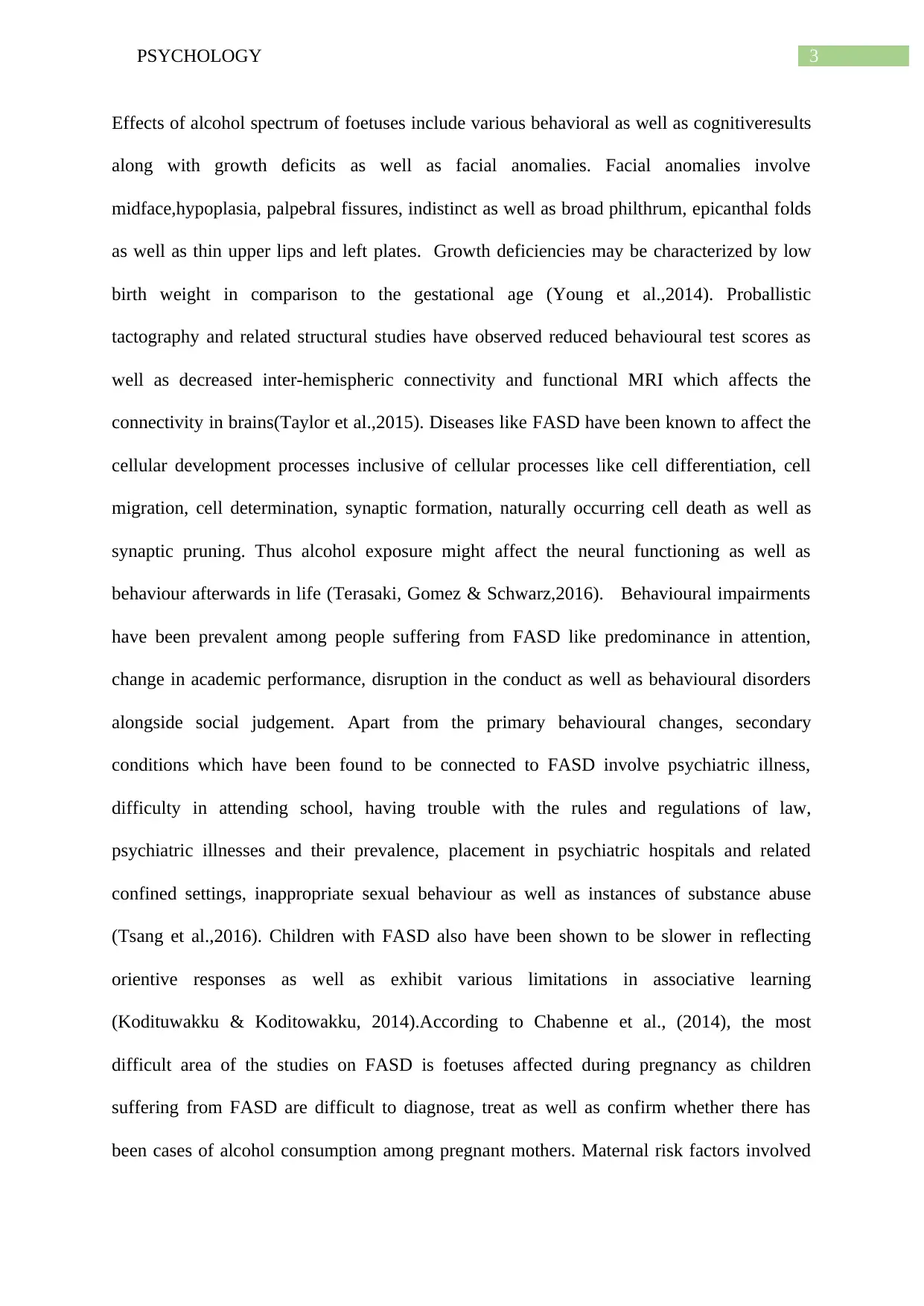
3PSYCHOLOGY
Effects of alcohol spectrum of foetuses include various behavioral as well as cognitiveresults
along with growth deficits as well as facial anomalies. Facial anomalies involve
midface,hypoplasia, palpebral fissures, indistinct as well as broad philthrum, epicanthal folds
as well as thin upper lips and left plates. Growth deficiencies may be characterized by low
birth weight in comparison to the gestational age (Young et al.,2014). Proballistic
tactography and related structural studies have observed reduced behavioural test scores as
well as decreased inter-hemispheric connectivity and functional MRI which affects the
connectivity in brains(Taylor et al.,2015). Diseases like FASD have been known to affect the
cellular development processes inclusive of cellular processes like cell differentiation, cell
migration, cell determination, synaptic formation, naturally occurring cell death as well as
synaptic pruning. Thus alcohol exposure might affect the neural functioning as well as
behaviour afterwards in life (Terasaki, Gomez & Schwarz,2016). Behavioural impairments
have been prevalent among people suffering from FASD like predominance in attention,
change in academic performance, disruption in the conduct as well as behavioural disorders
alongside social judgement. Apart from the primary behavioural changes, secondary
conditions which have been found to be connected to FASD involve psychiatric illness,
difficulty in attending school, having trouble with the rules and regulations of law,
psychiatric illnesses and their prevalence, placement in psychiatric hospitals and related
confined settings, inappropriate sexual behaviour as well as instances of substance abuse
(Tsang et al.,2016). Children with FASD also have been shown to be slower in reflecting
orientive responses as well as exhibit various limitations in associative learning
(Kodituwakku & Koditowakku, 2014).According to Chabenne et al., (2014), the most
difficult area of the studies on FASD is foetuses affected during pregnancy as children
suffering from FASD are difficult to diagnose, treat as well as confirm whether there has
been cases of alcohol consumption among pregnant mothers. Maternal risk factors involved
Effects of alcohol spectrum of foetuses include various behavioral as well as cognitiveresults
along with growth deficits as well as facial anomalies. Facial anomalies involve
midface,hypoplasia, palpebral fissures, indistinct as well as broad philthrum, epicanthal folds
as well as thin upper lips and left plates. Growth deficiencies may be characterized by low
birth weight in comparison to the gestational age (Young et al.,2014). Proballistic
tactography and related structural studies have observed reduced behavioural test scores as
well as decreased inter-hemispheric connectivity and functional MRI which affects the
connectivity in brains(Taylor et al.,2015). Diseases like FASD have been known to affect the
cellular development processes inclusive of cellular processes like cell differentiation, cell
migration, cell determination, synaptic formation, naturally occurring cell death as well as
synaptic pruning. Thus alcohol exposure might affect the neural functioning as well as
behaviour afterwards in life (Terasaki, Gomez & Schwarz,2016). Behavioural impairments
have been prevalent among people suffering from FASD like predominance in attention,
change in academic performance, disruption in the conduct as well as behavioural disorders
alongside social judgement. Apart from the primary behavioural changes, secondary
conditions which have been found to be connected to FASD involve psychiatric illness,
difficulty in attending school, having trouble with the rules and regulations of law,
psychiatric illnesses and their prevalence, placement in psychiatric hospitals and related
confined settings, inappropriate sexual behaviour as well as instances of substance abuse
(Tsang et al.,2016). Children with FASD also have been shown to be slower in reflecting
orientive responses as well as exhibit various limitations in associative learning
(Kodituwakku & Koditowakku, 2014).According to Chabenne et al., (2014), the most
difficult area of the studies on FASD is foetuses affected during pregnancy as children
suffering from FASD are difficult to diagnose, treat as well as confirm whether there has
been cases of alcohol consumption among pregnant mothers. Maternal risk factors involved
⊘ This is a preview!⊘
Do you want full access?
Subscribe today to unlock all pages.

Trusted by 1+ million students worldwide
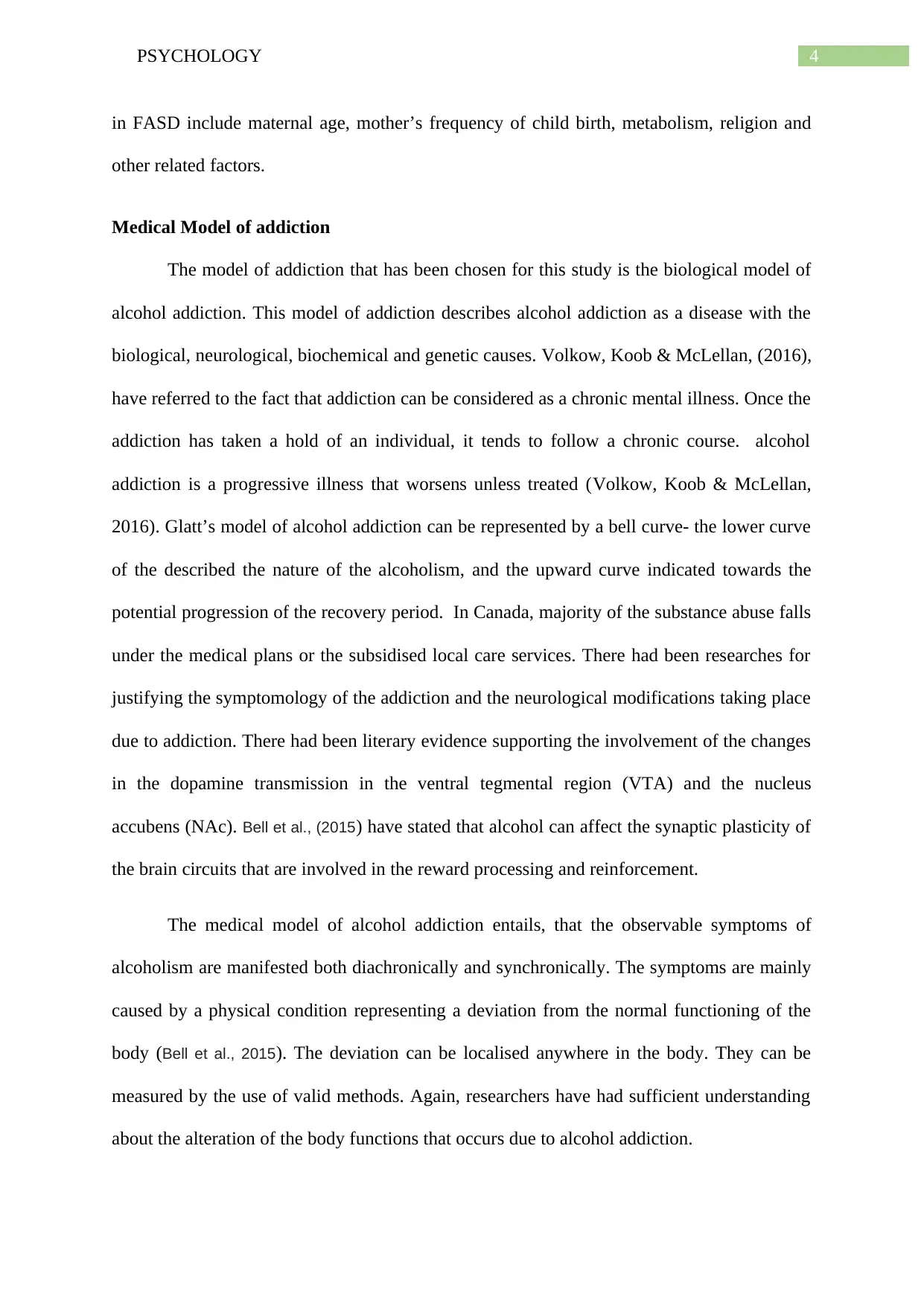
4PSYCHOLOGY
in FASD include maternal age, mother’s frequency of child birth, metabolism, religion and
other related factors.
Medical Model of addiction
The model of addiction that has been chosen for this study is the biological model of
alcohol addiction. This model of addiction describes alcohol addiction as a disease with the
biological, neurological, biochemical and genetic causes. Volkow, Koob & McLellan, (2016),
have referred to the fact that addiction can be considered as a chronic mental illness. Once the
addiction has taken a hold of an individual, it tends to follow a chronic course. alcohol
addiction is a progressive illness that worsens unless treated (Volkow, Koob & McLellan,
2016). Glatt’s model of alcohol addiction can be represented by a bell curve- the lower curve
of the described the nature of the alcoholism, and the upward curve indicated towards the
potential progression of the recovery period. In Canada, majority of the substance abuse falls
under the medical plans or the subsidised local care services. There had been researches for
justifying the symptomology of the addiction and the neurological modifications taking place
due to addiction. There had been literary evidence supporting the involvement of the changes
in the dopamine transmission in the ventral tegmental region (VTA) and the nucleus
accubens (NAc). Bell et al., (2015) have stated that alcohol can affect the synaptic plasticity of
the brain circuits that are involved in the reward processing and reinforcement.
The medical model of alcohol addiction entails, that the observable symptoms of
alcoholism are manifested both diachronically and synchronically. The symptoms are mainly
caused by a physical condition representing a deviation from the normal functioning of the
body (Bell et al., 2015). The deviation can be localised anywhere in the body. They can be
measured by the use of valid methods. Again, researchers have had sufficient understanding
about the alteration of the body functions that occurs due to alcohol addiction.
in FASD include maternal age, mother’s frequency of child birth, metabolism, religion and
other related factors.
Medical Model of addiction
The model of addiction that has been chosen for this study is the biological model of
alcohol addiction. This model of addiction describes alcohol addiction as a disease with the
biological, neurological, biochemical and genetic causes. Volkow, Koob & McLellan, (2016),
have referred to the fact that addiction can be considered as a chronic mental illness. Once the
addiction has taken a hold of an individual, it tends to follow a chronic course. alcohol
addiction is a progressive illness that worsens unless treated (Volkow, Koob & McLellan,
2016). Glatt’s model of alcohol addiction can be represented by a bell curve- the lower curve
of the described the nature of the alcoholism, and the upward curve indicated towards the
potential progression of the recovery period. In Canada, majority of the substance abuse falls
under the medical plans or the subsidised local care services. There had been researches for
justifying the symptomology of the addiction and the neurological modifications taking place
due to addiction. There had been literary evidence supporting the involvement of the changes
in the dopamine transmission in the ventral tegmental region (VTA) and the nucleus
accubens (NAc). Bell et al., (2015) have stated that alcohol can affect the synaptic plasticity of
the brain circuits that are involved in the reward processing and reinforcement.
The medical model of alcohol addiction entails, that the observable symptoms of
alcoholism are manifested both diachronically and synchronically. The symptoms are mainly
caused by a physical condition representing a deviation from the normal functioning of the
body (Bell et al., 2015). The deviation can be localised anywhere in the body. They can be
measured by the use of valid methods. Again, researchers have had sufficient understanding
about the alteration of the body functions that occurs due to alcohol addiction.
Paraphrase This Document
Need a fresh take? Get an instant paraphrase of this document with our AI Paraphraser
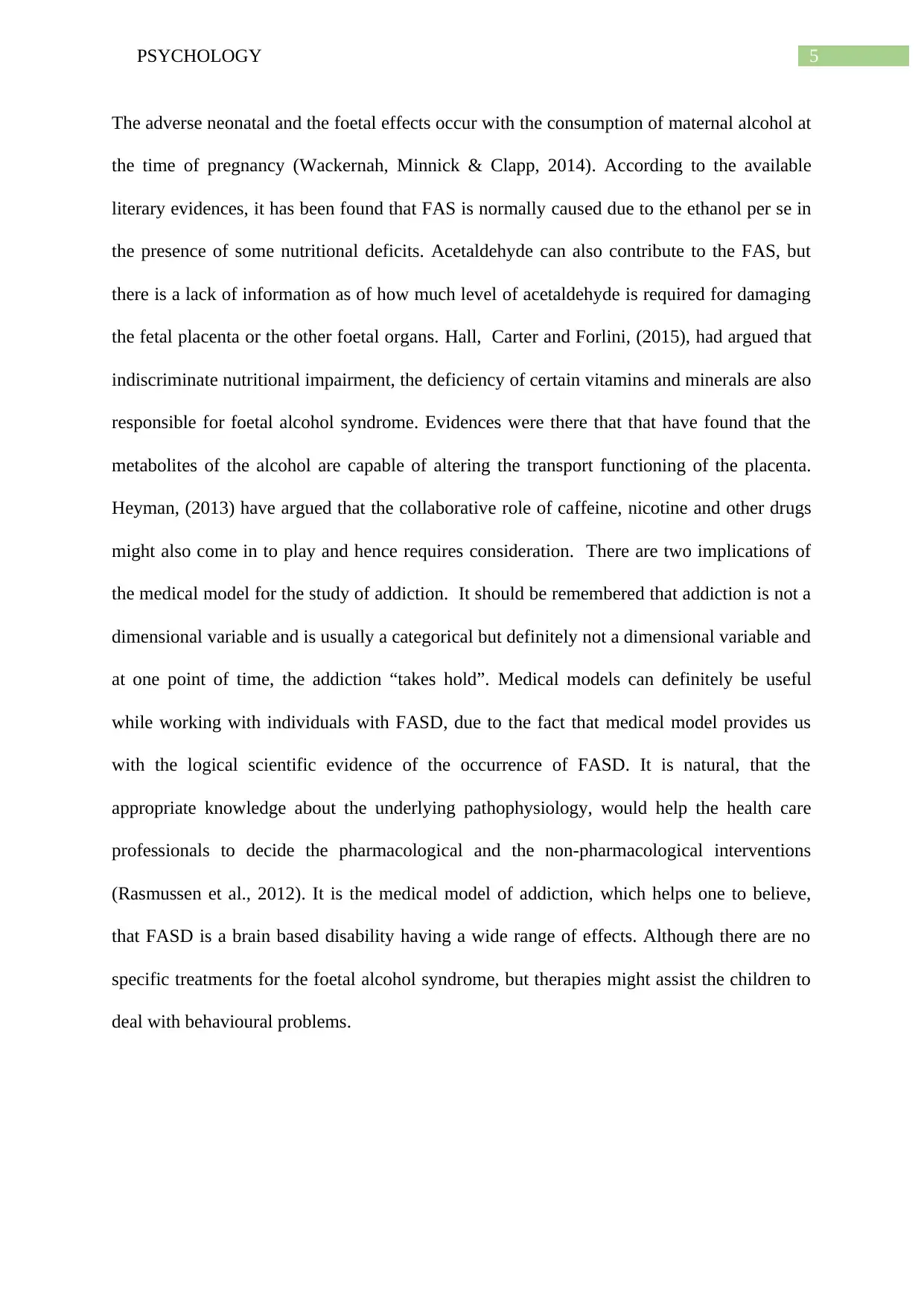
5PSYCHOLOGY
The adverse neonatal and the foetal effects occur with the consumption of maternal alcohol at
the time of pregnancy (Wackernah, Minnick & Clapp, 2014). According to the available
literary evidences, it has been found that FAS is normally caused due to the ethanol per se in
the presence of some nutritional deficits. Acetaldehyde can also contribute to the FAS, but
there is a lack of information as of how much level of acetaldehyde is required for damaging
the fetal placenta or the other foetal organs. Hall, Carter and Forlini, (2015), had argued that
indiscriminate nutritional impairment, the deficiency of certain vitamins and minerals are also
responsible for foetal alcohol syndrome. Evidences were there that that have found that the
metabolites of the alcohol are capable of altering the transport functioning of the placenta.
Heyman, (2013) have argued that the collaborative role of caffeine, nicotine and other drugs
might also come in to play and hence requires consideration. There are two implications of
the medical model for the study of addiction. It should be remembered that addiction is not a
dimensional variable and is usually a categorical but definitely not a dimensional variable and
at one point of time, the addiction “takes hold”. Medical models can definitely be useful
while working with individuals with FASD, due to the fact that medical model provides us
with the logical scientific evidence of the occurrence of FASD. It is natural, that the
appropriate knowledge about the underlying pathophysiology, would help the health care
professionals to decide the pharmacological and the non-pharmacological interventions
(Rasmussen et al., 2012). It is the medical model of addiction, which helps one to believe,
that FASD is a brain based disability having a wide range of effects. Although there are no
specific treatments for the foetal alcohol syndrome, but therapies might assist the children to
deal with behavioural problems.
The adverse neonatal and the foetal effects occur with the consumption of maternal alcohol at
the time of pregnancy (Wackernah, Minnick & Clapp, 2014). According to the available
literary evidences, it has been found that FAS is normally caused due to the ethanol per se in
the presence of some nutritional deficits. Acetaldehyde can also contribute to the FAS, but
there is a lack of information as of how much level of acetaldehyde is required for damaging
the fetal placenta or the other foetal organs. Hall, Carter and Forlini, (2015), had argued that
indiscriminate nutritional impairment, the deficiency of certain vitamins and minerals are also
responsible for foetal alcohol syndrome. Evidences were there that that have found that the
metabolites of the alcohol are capable of altering the transport functioning of the placenta.
Heyman, (2013) have argued that the collaborative role of caffeine, nicotine and other drugs
might also come in to play and hence requires consideration. There are two implications of
the medical model for the study of addiction. It should be remembered that addiction is not a
dimensional variable and is usually a categorical but definitely not a dimensional variable and
at one point of time, the addiction “takes hold”. Medical models can definitely be useful
while working with individuals with FASD, due to the fact that medical model provides us
with the logical scientific evidence of the occurrence of FASD. It is natural, that the
appropriate knowledge about the underlying pathophysiology, would help the health care
professionals to decide the pharmacological and the non-pharmacological interventions
(Rasmussen et al., 2012). It is the medical model of addiction, which helps one to believe,
that FASD is a brain based disability having a wide range of effects. Although there are no
specific treatments for the foetal alcohol syndrome, but therapies might assist the children to
deal with behavioural problems.
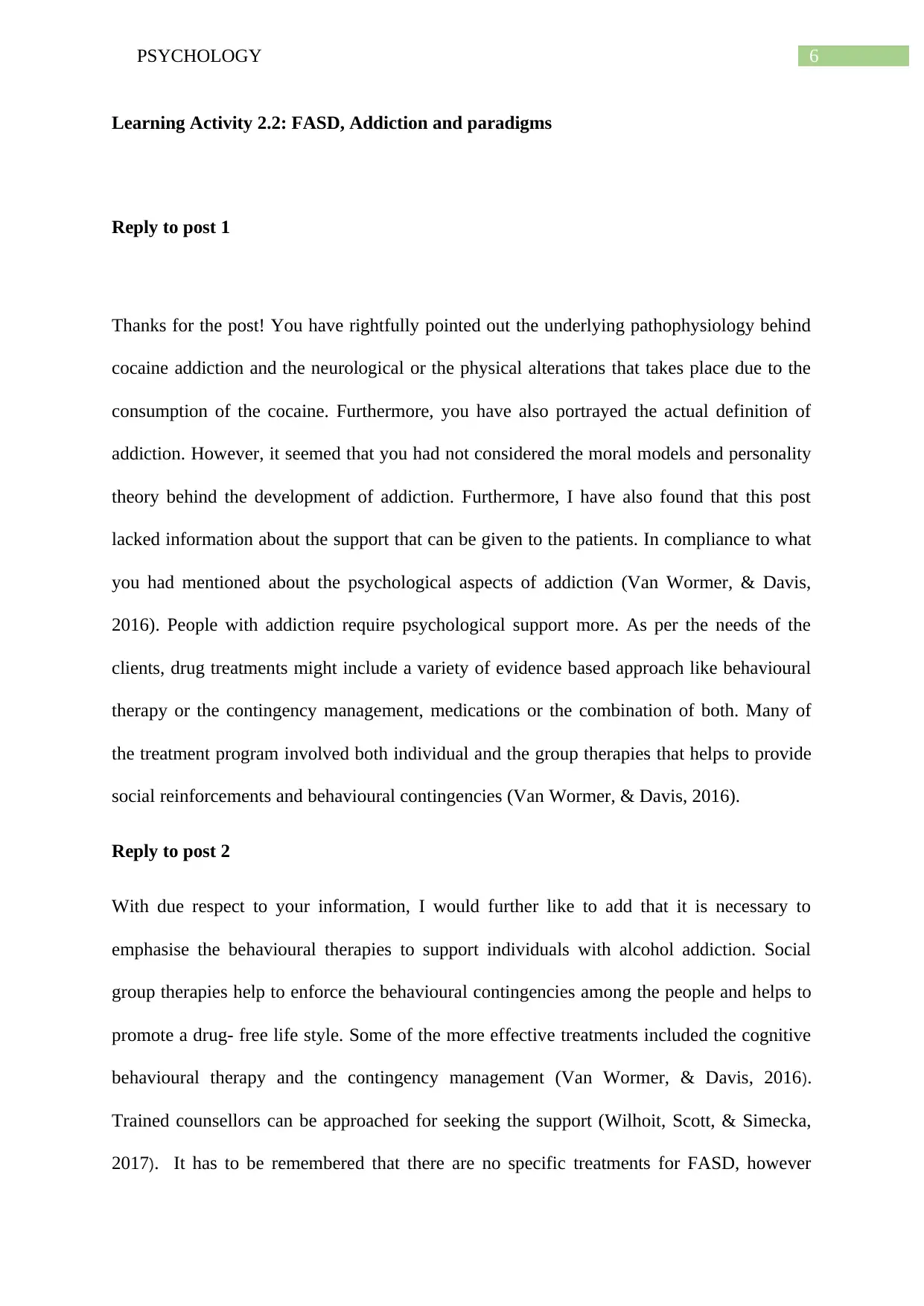
6PSYCHOLOGY
Learning Activity 2.2: FASD, Addiction and paradigms
Reply to post 1
Thanks for the post! You have rightfully pointed out the underlying pathophysiology behind
cocaine addiction and the neurological or the physical alterations that takes place due to the
consumption of the cocaine. Furthermore, you have also portrayed the actual definition of
addiction. However, it seemed that you had not considered the moral models and personality
theory behind the development of addiction. Furthermore, I have also found that this post
lacked information about the support that can be given to the patients. In compliance to what
you had mentioned about the psychological aspects of addiction (Van Wormer, & Davis,
2016). People with addiction require psychological support more. As per the needs of the
clients, drug treatments might include a variety of evidence based approach like behavioural
therapy or the contingency management, medications or the combination of both. Many of
the treatment program involved both individual and the group therapies that helps to provide
social reinforcements and behavioural contingencies (Van Wormer, & Davis, 2016).
Reply to post 2
With due respect to your information, I would further like to add that it is necessary to
emphasise the behavioural therapies to support individuals with alcohol addiction. Social
group therapies help to enforce the behavioural contingencies among the people and helps to
promote a drug- free life style. Some of the more effective treatments included the cognitive
behavioural therapy and the contingency management (Van Wormer, & Davis, 2016).
Trained counsellors can be approached for seeking the support (Wilhoit, Scott, & Simecka,
2017). It has to be remembered that there are no specific treatments for FASD, however
Learning Activity 2.2: FASD, Addiction and paradigms
Reply to post 1
Thanks for the post! You have rightfully pointed out the underlying pathophysiology behind
cocaine addiction and the neurological or the physical alterations that takes place due to the
consumption of the cocaine. Furthermore, you have also portrayed the actual definition of
addiction. However, it seemed that you had not considered the moral models and personality
theory behind the development of addiction. Furthermore, I have also found that this post
lacked information about the support that can be given to the patients. In compliance to what
you had mentioned about the psychological aspects of addiction (Van Wormer, & Davis,
2016). People with addiction require psychological support more. As per the needs of the
clients, drug treatments might include a variety of evidence based approach like behavioural
therapy or the contingency management, medications or the combination of both. Many of
the treatment program involved both individual and the group therapies that helps to provide
social reinforcements and behavioural contingencies (Van Wormer, & Davis, 2016).
Reply to post 2
With due respect to your information, I would further like to add that it is necessary to
emphasise the behavioural therapies to support individuals with alcohol addiction. Social
group therapies help to enforce the behavioural contingencies among the people and helps to
promote a drug- free life style. Some of the more effective treatments included the cognitive
behavioural therapy and the contingency management (Van Wormer, & Davis, 2016).
Trained counsellors can be approached for seeking the support (Wilhoit, Scott, & Simecka,
2017). It has to be remembered that there are no specific treatments for FASD, however
⊘ This is a preview!⊘
Do you want full access?
Subscribe today to unlock all pages.

Trusted by 1+ million students worldwide

7PSYCHOLOGY
some of the early intervention services can be useful, such as seeking therapy from special
education teacher, occupational therapists and a psychologists, special services to assist with
the behavioural and the learning issues.
some of the early intervention services can be useful, such as seeking therapy from special
education teacher, occupational therapists and a psychologists, special services to assist with
the behavioural and the learning issues.
Paraphrase This Document
Need a fresh take? Get an instant paraphrase of this document with our AI Paraphraser
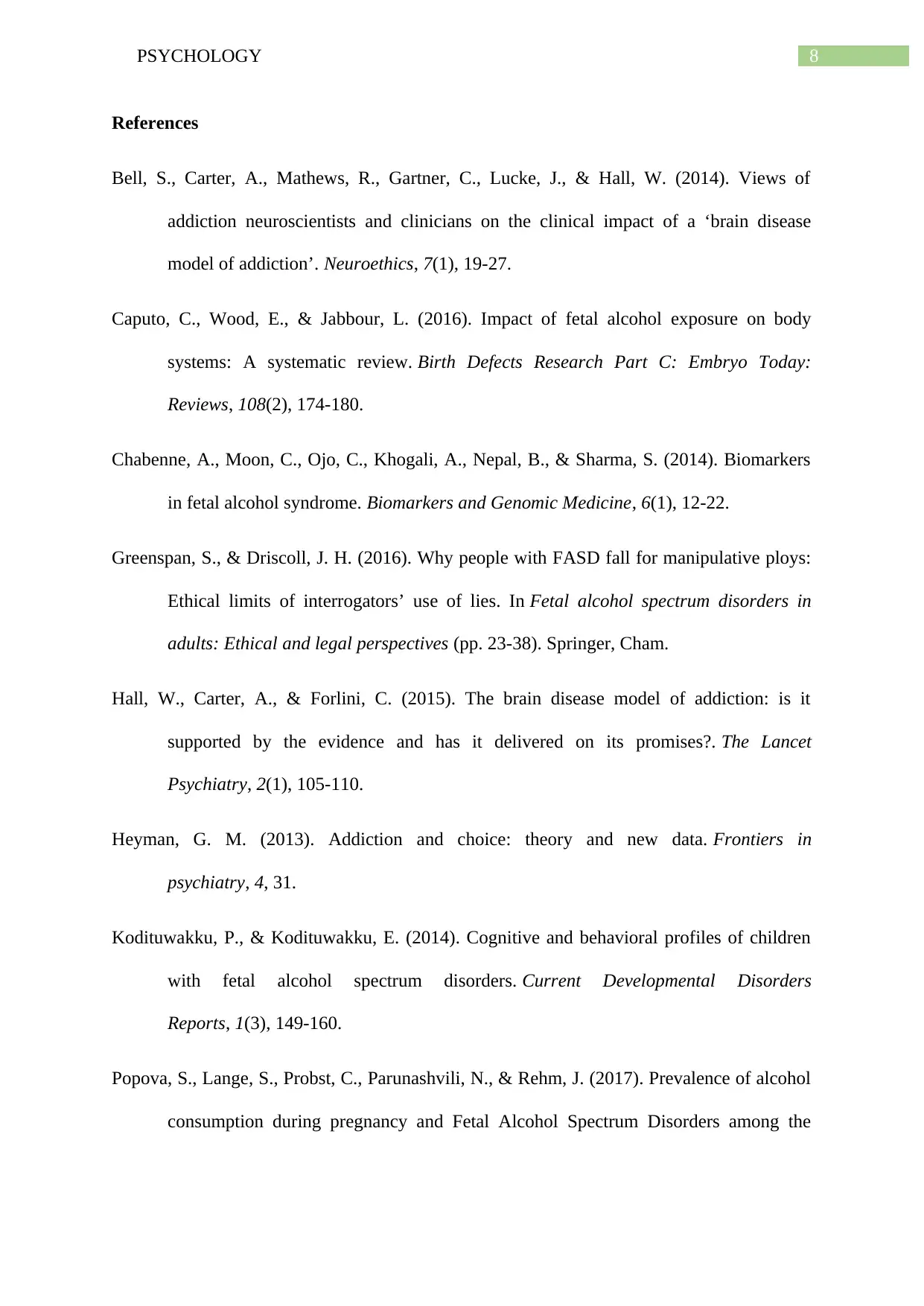
8PSYCHOLOGY
References
Bell, S., Carter, A., Mathews, R., Gartner, C., Lucke, J., & Hall, W. (2014). Views of
addiction neuroscientists and clinicians on the clinical impact of a ‘brain disease
model of addiction’. Neuroethics, 7(1), 19-27.
Caputo, C., Wood, E., & Jabbour, L. (2016). Impact of fetal alcohol exposure on body
systems: A systematic review. Birth Defects Research Part C: Embryo Today:
Reviews, 108(2), 174-180.
Chabenne, A., Moon, C., Ojo, C., Khogali, A., Nepal, B., & Sharma, S. (2014). Biomarkers
in fetal alcohol syndrome. Biomarkers and Genomic Medicine, 6(1), 12-22.
Greenspan, S., & Driscoll, J. H. (2016). Why people with FASD fall for manipulative ploys:
Ethical limits of interrogators’ use of lies. In Fetal alcohol spectrum disorders in
adults: Ethical and legal perspectives (pp. 23-38). Springer, Cham.
Hall, W., Carter, A., & Forlini, C. (2015). The brain disease model of addiction: is it
supported by the evidence and has it delivered on its promises?. The Lancet
Psychiatry, 2(1), 105-110.
Heyman, G. M. (2013). Addiction and choice: theory and new data. Frontiers in
psychiatry, 4, 31.
Kodituwakku, P., & Kodituwakku, E. (2014). Cognitive and behavioral profiles of children
with fetal alcohol spectrum disorders. Current Developmental Disorders
Reports, 1(3), 149-160.
Popova, S., Lange, S., Probst, C., Parunashvili, N., & Rehm, J. (2017). Prevalence of alcohol
consumption during pregnancy and Fetal Alcohol Spectrum Disorders among the
References
Bell, S., Carter, A., Mathews, R., Gartner, C., Lucke, J., & Hall, W. (2014). Views of
addiction neuroscientists and clinicians on the clinical impact of a ‘brain disease
model of addiction’. Neuroethics, 7(1), 19-27.
Caputo, C., Wood, E., & Jabbour, L. (2016). Impact of fetal alcohol exposure on body
systems: A systematic review. Birth Defects Research Part C: Embryo Today:
Reviews, 108(2), 174-180.
Chabenne, A., Moon, C., Ojo, C., Khogali, A., Nepal, B., & Sharma, S. (2014). Biomarkers
in fetal alcohol syndrome. Biomarkers and Genomic Medicine, 6(1), 12-22.
Greenspan, S., & Driscoll, J. H. (2016). Why people with FASD fall for manipulative ploys:
Ethical limits of interrogators’ use of lies. In Fetal alcohol spectrum disorders in
adults: Ethical and legal perspectives (pp. 23-38). Springer, Cham.
Hall, W., Carter, A., & Forlini, C. (2015). The brain disease model of addiction: is it
supported by the evidence and has it delivered on its promises?. The Lancet
Psychiatry, 2(1), 105-110.
Heyman, G. M. (2013). Addiction and choice: theory and new data. Frontiers in
psychiatry, 4, 31.
Kodituwakku, P., & Kodituwakku, E. (2014). Cognitive and behavioral profiles of children
with fetal alcohol spectrum disorders. Current Developmental Disorders
Reports, 1(3), 149-160.
Popova, S., Lange, S., Probst, C., Parunashvili, N., & Rehm, J. (2017). Prevalence of alcohol
consumption during pregnancy and Fetal Alcohol Spectrum Disorders among the
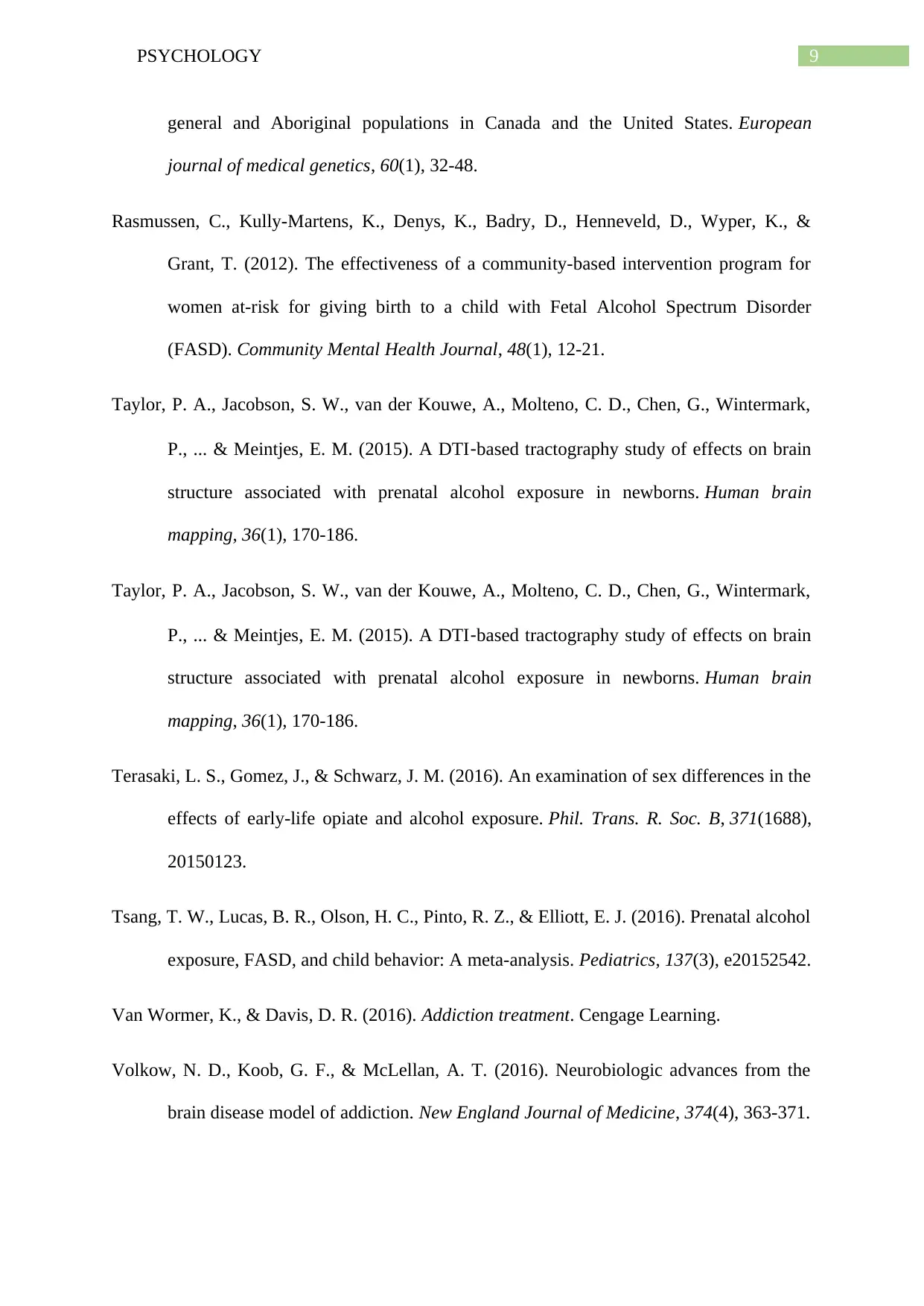
9PSYCHOLOGY
general and Aboriginal populations in Canada and the United States. European
journal of medical genetics, 60(1), 32-48.
Rasmussen, C., Kully-Martens, K., Denys, K., Badry, D., Henneveld, D., Wyper, K., &
Grant, T. (2012). The effectiveness of a community-based intervention program for
women at-risk for giving birth to a child with Fetal Alcohol Spectrum Disorder
(FASD). Community Mental Health Journal, 48(1), 12-21.
Taylor, P. A., Jacobson, S. W., van der Kouwe, A., Molteno, C. D., Chen, G., Wintermark,
P., ... & Meintjes, E. M. (2015). A DTI‐based tractography study of effects on brain
structure associated with prenatal alcohol exposure in newborns. Human brain
mapping, 36(1), 170-186.
Taylor, P. A., Jacobson, S. W., van der Kouwe, A., Molteno, C. D., Chen, G., Wintermark,
P., ... & Meintjes, E. M. (2015). A DTI‐based tractography study of effects on brain
structure associated with prenatal alcohol exposure in newborns. Human brain
mapping, 36(1), 170-186.
Terasaki, L. S., Gomez, J., & Schwarz, J. M. (2016). An examination of sex differences in the
effects of early-life opiate and alcohol exposure. Phil. Trans. R. Soc. B, 371(1688),
20150123.
Tsang, T. W., Lucas, B. R., Olson, H. C., Pinto, R. Z., & Elliott, E. J. (2016). Prenatal alcohol
exposure, FASD, and child behavior: A meta-analysis. Pediatrics, 137(3), e20152542.
Van Wormer, K., & Davis, D. R. (2016). Addiction treatment. Cengage Learning.
Volkow, N. D., Koob, G. F., & McLellan, A. T. (2016). Neurobiologic advances from the
brain disease model of addiction. New England Journal of Medicine, 374(4), 363-371.
general and Aboriginal populations in Canada and the United States. European
journal of medical genetics, 60(1), 32-48.
Rasmussen, C., Kully-Martens, K., Denys, K., Badry, D., Henneveld, D., Wyper, K., &
Grant, T. (2012). The effectiveness of a community-based intervention program for
women at-risk for giving birth to a child with Fetal Alcohol Spectrum Disorder
(FASD). Community Mental Health Journal, 48(1), 12-21.
Taylor, P. A., Jacobson, S. W., van der Kouwe, A., Molteno, C. D., Chen, G., Wintermark,
P., ... & Meintjes, E. M. (2015). A DTI‐based tractography study of effects on brain
structure associated with prenatal alcohol exposure in newborns. Human brain
mapping, 36(1), 170-186.
Taylor, P. A., Jacobson, S. W., van der Kouwe, A., Molteno, C. D., Chen, G., Wintermark,
P., ... & Meintjes, E. M. (2015). A DTI‐based tractography study of effects on brain
structure associated with prenatal alcohol exposure in newborns. Human brain
mapping, 36(1), 170-186.
Terasaki, L. S., Gomez, J., & Schwarz, J. M. (2016). An examination of sex differences in the
effects of early-life opiate and alcohol exposure. Phil. Trans. R. Soc. B, 371(1688),
20150123.
Tsang, T. W., Lucas, B. R., Olson, H. C., Pinto, R. Z., & Elliott, E. J. (2016). Prenatal alcohol
exposure, FASD, and child behavior: A meta-analysis. Pediatrics, 137(3), e20152542.
Van Wormer, K., & Davis, D. R. (2016). Addiction treatment. Cengage Learning.
Volkow, N. D., Koob, G. F., & McLellan, A. T. (2016). Neurobiologic advances from the
brain disease model of addiction. New England Journal of Medicine, 374(4), 363-371.
⊘ This is a preview!⊘
Do you want full access?
Subscribe today to unlock all pages.

Trusted by 1+ million students worldwide
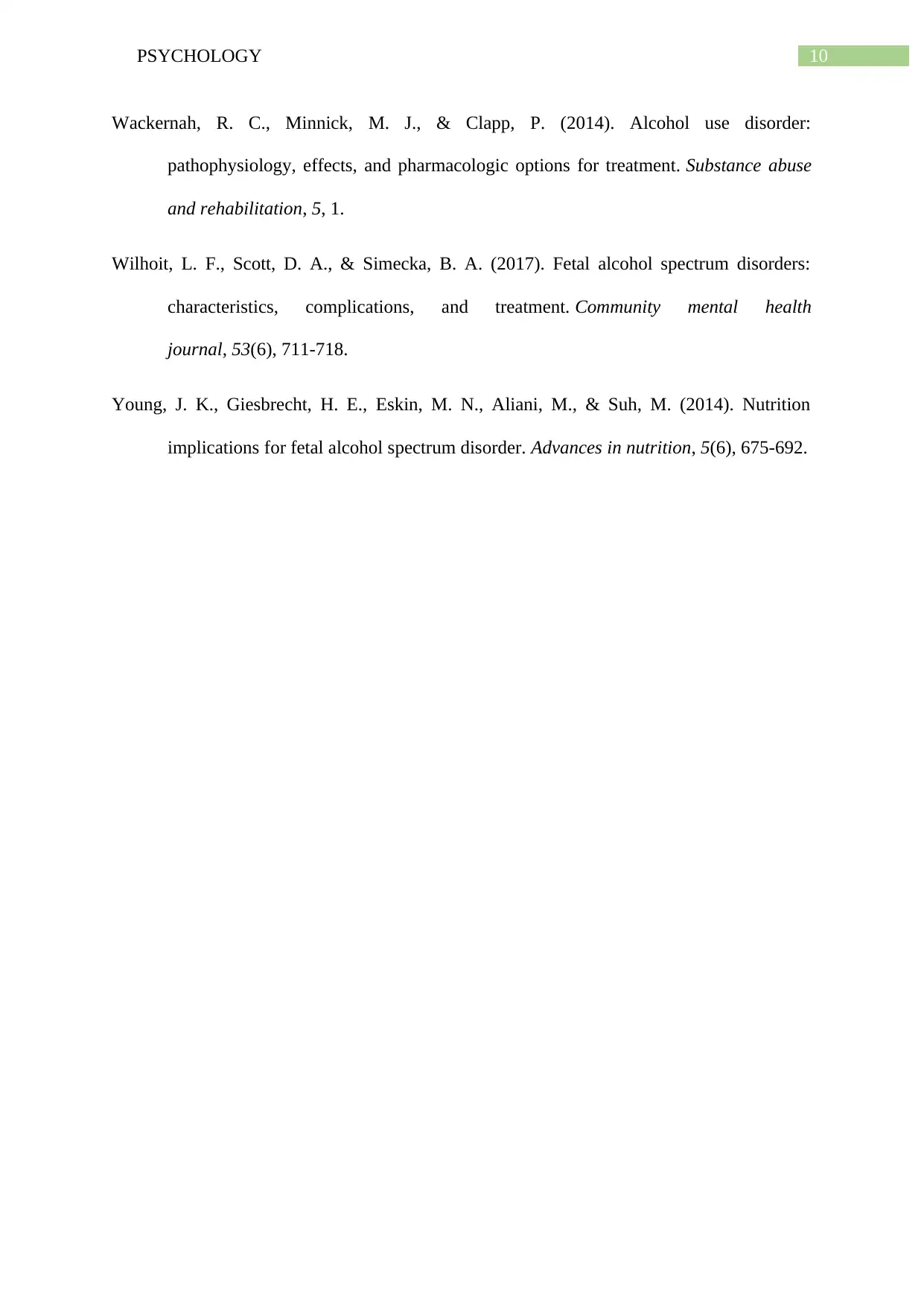
10PSYCHOLOGY
Wackernah, R. C., Minnick, M. J., & Clapp, P. (2014). Alcohol use disorder:
pathophysiology, effects, and pharmacologic options for treatment. Substance abuse
and rehabilitation, 5, 1.
Wilhoit, L. F., Scott, D. A., & Simecka, B. A. (2017). Fetal alcohol spectrum disorders:
characteristics, complications, and treatment. Community mental health
journal, 53(6), 711-718.
Young, J. K., Giesbrecht, H. E., Eskin, M. N., Aliani, M., & Suh, M. (2014). Nutrition
implications for fetal alcohol spectrum disorder. Advances in nutrition, 5(6), 675-692.
Wackernah, R. C., Minnick, M. J., & Clapp, P. (2014). Alcohol use disorder:
pathophysiology, effects, and pharmacologic options for treatment. Substance abuse
and rehabilitation, 5, 1.
Wilhoit, L. F., Scott, D. A., & Simecka, B. A. (2017). Fetal alcohol spectrum disorders:
characteristics, complications, and treatment. Community mental health
journal, 53(6), 711-718.
Young, J. K., Giesbrecht, H. E., Eskin, M. N., Aliani, M., & Suh, M. (2014). Nutrition
implications for fetal alcohol spectrum disorder. Advances in nutrition, 5(6), 675-692.
1 out of 10
Your All-in-One AI-Powered Toolkit for Academic Success.
+13062052269
info@desklib.com
Available 24*7 on WhatsApp / Email
![[object Object]](/_next/static/media/star-bottom.7253800d.svg)
Unlock your academic potential
Copyright © 2020–2026 A2Z Services. All Rights Reserved. Developed and managed by ZUCOL.
